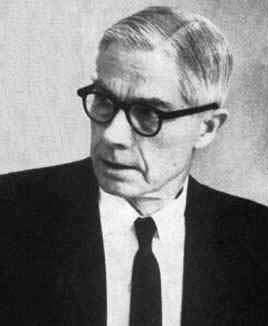
Wallace John Eckert
 المؤلف:
H S Tropp
المؤلف:
H S Tropp
 المصدر:
Biography in Dictionary of Scientific Biography
المصدر:
Biography in Dictionary of Scientific Biography
 الجزء والصفحة:
...
الجزء والصفحة:
...
 11-10-2017
11-10-2017
 908
908
Born: 19 June 1902 in Pittsburgh, Pennsylvania, USA
Died: 24 August 1971 in Englewood, New Jersey, USA

Wallace J Eckert earned his PhD was from Yale in 1931 in astronomy. At that time Ernest Brown was a member of the astronomy department and Brown's work on the Moon was an important ingredient of Eckert's later work. Eckert had joined the Faculty at Columbia University in 1926 and later he became professor there.
Eckert was an early user of IBM punch card equipment to reduce astronomical data and solve numerically planetary orbits. In 1937 Columbia University and IBM established the Thomas J Watson Astronomical Computing Bureau as a result of the collaboration with Eckert. In fact the work which led to this development was published by Eckert in Punched card methods in scientific computation (1940).
In 1940 Eckert became director of the US Nautical Almanac Office and produced work vital to navigation during World War II. In this post he introduced machine methods to compute and print tables and he began publication of the Air Almanac in 1940.
In 1945 Eckert became director of the Watson Scientific Computing Laboratory at Columbia University. As stated in [3]:-
During the more than 20 years he was in charge of the laboratory, it was a major training center for scientific computation, where more than 1,000 astronomers, physicists, crystallographers, statisticians, and other scientists studied.
Eckert directed the construction of a number of innovative computers. In 1949 the Selective Sequence Electronic Calculator (SSEC) was built. Later the Naval Ordnance Research Calculator (NORC) was built. Completed in 1954 it was for many years the most powerful computer in the world.
Eckert applied computers, in particular the SSEC and NORC, to compute precise planetary positions and contribute to the theory of the orbit of the Moon. In particular he used the SSEC to compute the positions of Jupiter, Saturn, Uranus, Neptune and Pluto, publishing the results in 1951 in Coordinates of the five outer planets.
The NORC was used by Eckert to work on the problem of the position of the Moon. Writing in 1954 Eckert explained the how Brown had calculated the Moon's position:-
Since 1923 the work of E W Brown has constituted the basis for the published ephemerides of the moon. His monumental calculation, which occupied most of his lifetime, consists of two distinct steps. The first is the development of the theory or the solution of the differential equations of motion expressing the coordinates of the moon as explicit functions of time. Secondly, in order to reduce the necessary labor involved in computing the coordinates of the moon for any given date from these formulae, Brown computed from his theory a set of Tables which, including the necessary explanations, comprise over 650 large quarto pages. ... In order to bring the Tables within even their present length, various parts of the basic equations were curtailed whenever permissible in the light of observational requirements (as then visualised).
However by the 1950s it was realised that the Tables were not accurate enough. Eckert therefore decided not to recompute new tables but to compute the ephemerides directly from Brown's equations. The task was immense for, see [3]:-
... Brown's formulae involved some 1,650 trigonometric terms, many of them with variable coefficients.
The accuracy of Eckert's calculations of the Moon's orbit was so good that in 1965 he was able to correctly show that there was a concentration of mass near the lunar surface. In 1967 he produced theoretical work which improved on Brown's theory of the Moon.
Eckert's work is summed up in [3]:-
Eckert retired in 1967 from IBM and in 1970 from his professorship at Columbia, greatly honored by his fellow astronomers but because of his modest nature little known to the public. Hardly any other astronomer of his generation influenced our science more profoundly.
- H S Tropp, Biography in Dictionary of Scientific Biography (New York 1970-1990).
Books:
- J F Brennam, The IBM Watson Laboratory at Columbia University : A History (Armonk, NY, 1971).
Articles:
- A great American astronomer, Sky and Telescope (October, 1971), 207.
- In memoriam W J Eckert (1902-1971), Celestial Mech. 6 (1972), 2-3.
 الاكثر قراءة في 1900to1904
الاكثر قراءة في 1900to1904
 اخر الاخبار
اخر الاخبار
اخبار العتبة العباسية المقدسة


